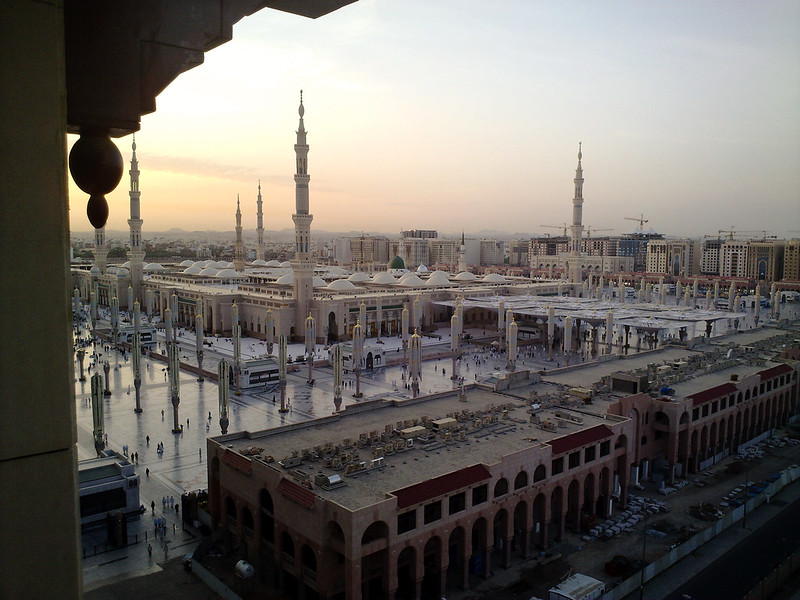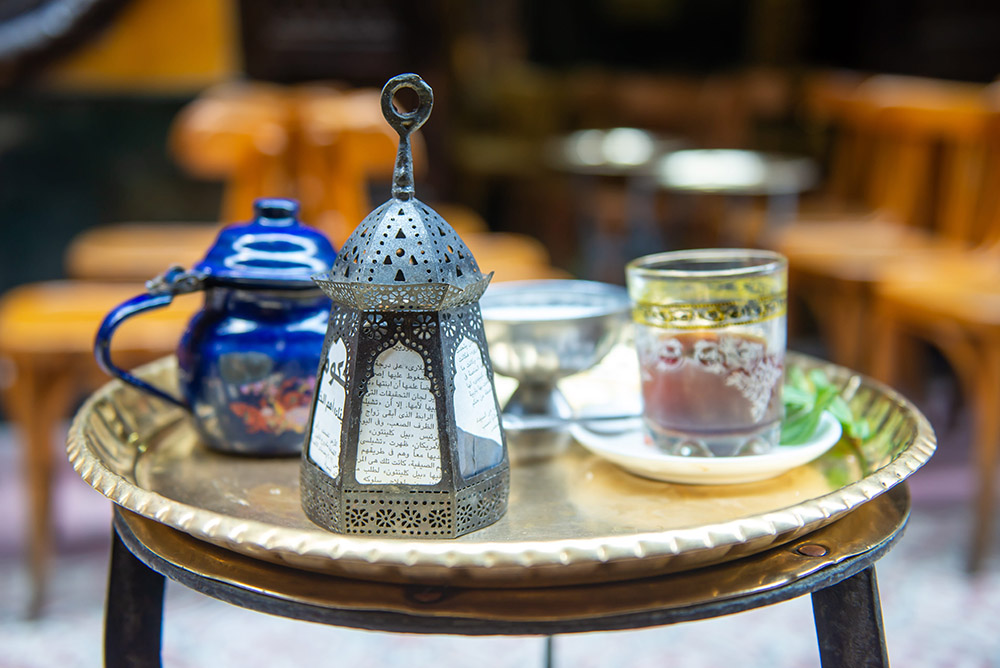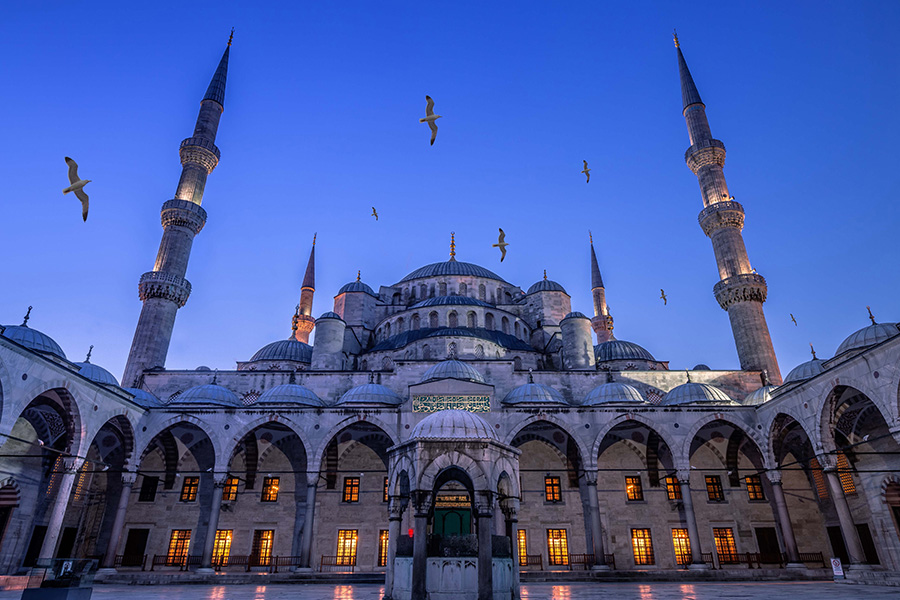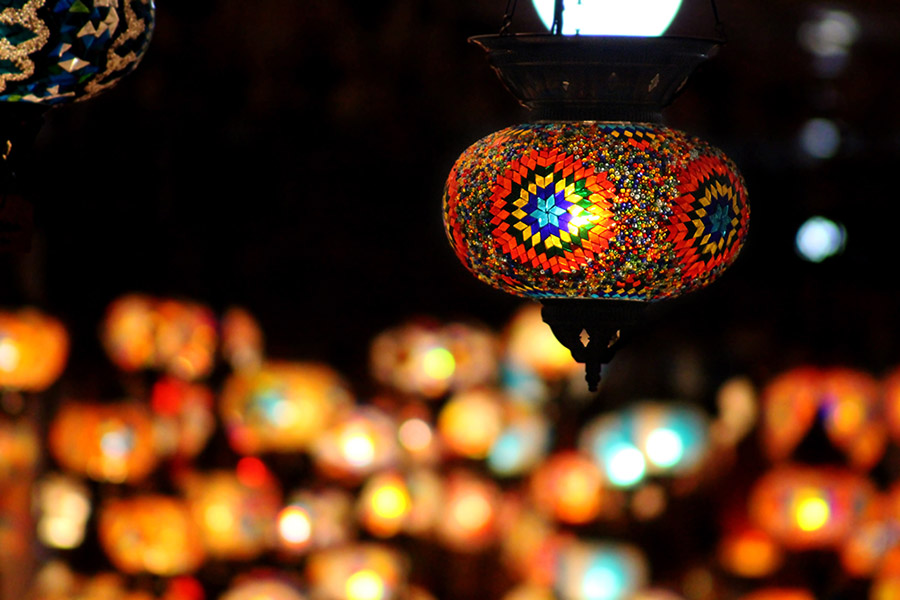Articles
Ramadan and fasting in monotheist religions
Dr. Mohamed Chtatou
Ramadan, a sacred month for Muslims, commemorates the revelation of the Qur’an to the Prophet Muhammad (ﷺ) (Surah 2, 185). It is the fourth of the five pillars of Islam. Fasting is therefore part of the prescriptions incumbent on Muslim believers, along with the shahâdah (profflickression of faith attesting that there is no god but God and that Muhammad is his messenger), salât (prayer), zakât (almsgiving) and hajj (pilgrimage to the holy sites of Mecca).
The Ramadan fast is now a global event. [i] In the global village, diplomats and business leaders have already incorporated it into their agendas. A month of asceticism for some, a month of good business for others, Ramadan imposes a new rhythm that goes beyond the disruption of eating habits. [ii]
Origins of Ramadan
The word “Ramadan” is derived from the Arabic ramîdah or ar-ramâd which means “great heat” and refers to the ninth month of the Muslim lunar calendar. In pre-Islamic Arab society, it was a month of truce which may have had a distant relationship with the sacred periods of Christianity (Lent) or Judaism (Yom Kippur). It could also correspond to a necessary civil and military inactivity during a heat wave. Abraham’s followers fasted at eclipses, equinoxes and solstices.
Islam, Judaism and Christianity have in common that they have put dietary prohibitions at the center of religious life. Moses, Jesus, Muhammad (ﷺ): all three fasted in the desert. Yom Kippur, Lent, Ramadan: three ways of observing the fast.
Born in the Middle East, in landscapes of sand and sun, the three great monotheistic religions have included this practice in their calendar. The duration varies, the modalities have evolved over the centuries, but for all of them, the time of fasting is an opportunity to refocus on the spiritual, and to open up to sharing and caring. Another way of being in the world. Ramadan corresponds to the ninth month of the lunar calendar, during which the archangel Gabriel revealed the Qur’an to Prophet Muhammad (ﷺ), according to Islam.
In the Jewish faith, Yom Kippur (also known as the “Day of Atonement”) is the holiest day of the Jewish faith. Jews may not eat, drink, work, have sex or bathe for 25 hours. Mandated in the Torah, believers are encouraged to consider their sins over the past year and repent.
Finally, in Hinduism, fasting is also practiced in order to detach the body from its physical needs for spiritual gain. By separating obsessions from material pleasures, Hindus create harmony between their body and soul. On Ekadashi, healthy adults are encouraged to fast completely. This practice, combined with prayer and meditation, helps to eliminate sins, purify the mind and train the believer to endure future hardships.
Over time, many religions have come to regard voluntary abstinence from food as an important spiritual purification rite. By encouraging penitence and sacrifice, the essence of fasting is to prevent physical needs from taking center stage.
Gandhi used fasting as a “non-violent weapon“, a weapon of incredible power, since he made the British bow to him. He conducted his last fast, in favor of reconciliation between Hindus and Muslims, at 78 years old, before being assassinated by a Hindu fanatic.
In Arabic, the word Ramadan means intense heat, because it is considered a good deed burning away sins. It allows Muslims to be closer to Allah, but also to the poorest, by feeling the sensations of hunger and thirst and that is in itself, also, a feeling of great heat and burning of the throat. [iii]
The 27th day of Ramadan commemorates the “Night of Destiny” when the angel Gabriel (Jibril) appeared for the first time to the Prophet Muhammad (ﷺ) to reveal the Qur’an to him. This month of fasting is therefore closely linked to the Muslim holy Qur’an, whose first revealed verse is “Read!’’ (Surah 96, Verse 1).
Muslims are therefore encouraged to read the entire Qur’an again during this month of Ramadan, hence the institution of an extra session of communal prayers (tarawîh) [iv] in the evening in mosques only during this time of the year – a tradition that some date back to the second Caliph Omar (579-644).
Why fast?
A central Islamic ritual in religious observance, fasting is also practiced by the followers of other religious traditions, as well as by a growing number of people “without religion”. Some even speak of an intriguing phenomenon in our society in search of meaning.
Bringing a dietary benefit, even therapeutic according to some, or synonymous with chosen sobriety in the face of consumerism excesses, fasting evokes a dimension of self-control and fraternal solidarity, of sharing and mutual aid, which is found in particular in observant Muslim families during the month of Ramadan.
What meaning do we give to fasting today? Where does the relative infatuation with it come from? What is its place in the Islamic canonical tradition, as well as its spiritual aims and ethical purposes, usually so little addressed not only by non-Muslim actors, but also by many faithful of Islam?
From the time of puberty, all Muslims must fast, except for those who are frail, elderly or suffering from certain diseases. This exemption also applies to those who have to travel or who are temporarily ill. In return, these people must feed a poor person for each day not fasted. Women who are breastfeeding or pregnant are also exempt. They should recover the days not fasted before the next Ramadan.

Fasting allows one to experience hunger and thirst. It reminds believers of the existence of the poor, which is reinforced by the prescription of zakât al-fitr (alms for the breaking of the fast), mentioned in several hadiths, the texts transmitted by the Prophet’s companions that record his deeds. “The best of all alms is the one given in the month of Ramadan,” [v] says one hadith.
In addition, Abu Hurairah reported Allah’s Messenger (ﷺ) as saying: [vi]
“Charity does not in any way decrease the wealth and the servant who forgives, Allah adds to his respect; and the one who shows humility, Allah elevates him in the estimation (of the people).”
Spiritually, Ramadan is an invitation to self-control and the exercise of the will, so that the acts of the believer are vehicles of divine mercy. Thus, fasting of the body should lead to fasting of the heart and bring the soul closer to God. The believer must work on himself to develop his qualities of goodness, benevolence, patience, perseverance, justice, solidarity, fraternity and fight against his defects of selfishness, hypocrisy, slander, and jealousy. [vii]
During this period, Muslims should pray, reflect on their faith and try to be better. They should, also, give alms, by donating money to the mosque or to someone in need, just before the end of Ramadan.
Fasting is, clearly, stated in the Holy Qur’an in the following important verses:
“Believers! Fasting is enjoined upon you, as it was enjoined upon those before you, that you become God-fearing.’’ (Surah 2, Verse 183).
يٰٓـاَيُّهَا الَّذِيۡنَ اٰمَنُوۡا كُتِبَ عَلَيۡکُمُ الصِّيَامُ کَمَا كُتِبَ عَلَى الَّذِيۡنَ مِنۡ قَبۡلِکُمۡ لَعَلَّكُمۡ تَتَّقُوۡنَۙ
‘’Fasting is for a fixed number of days, and if one of you be sick, or if one of you be on a journey, you will fast the same number of other days later on. For those who are capable of fasting (but still do not fast) there is a redemption: feeding a needy man for each day missed. Whoever voluntarily does more good than is required, will find it better for him; and that you should fast is better for you, if you only know.” (Surah 2, Verse 184).
أَيَّامًا مَّعْدُودَاتٍ فَمَن كَانَ مِنكُم مَّرِيضًا أَوْ عَلَى سَفَرٍ فَعِدَّةٌ مِّنْ أَيَّامٍ أُخَرَ وَعَلَى الَّذِينَ يُطِيقُونَهُ فِدْيَةٌ طَعَامُ مِسْكِينٍ فَمَن تَطَوَّعَ خَيْرًا فَهُوَ خَيْرٌ لَّهُ وَأَن تَصُومُوا خَيْرٌ لَّكُمْ إِن كُنتُمْ تَعْلَمُونَ
‘’During the month of Ramadan the Qur’an was sent down as a guidance to the people with Clear Signs of the true guidance and as the Criterion (between right and wrong). So those of you who live to see that month should fast it, and whoever is sick or on a journey should fast the same number of other days instead. Allah wants ease and not hardship for you so that you may complete the number of days required, magnify Allah for what He has guided you to, and give thanks to Him.’’ (Surah 2, Verse 185).
شَهْرُ رَمَضَانَ الَّذِي أُنزِلَ فِيهِ الْقُرْآنُ هُدًى لِّلنَّاسِ وَبَيِّنَاتٍ مِّنَ الْهُدَى وَالْفُرْقَانِ فَمَن شَهِدَ مِنكُمُ الشَّهْرَ فَلْيَصُمْهُ وَمَن كَانَ مَرِيضًا أَوْ عَلَى سَفَرٍ فَعِدَّةٌ مِّنْ أَيَّامٍ أُخَرَ يُرِيدُ اللَّهُ بِكُمُ الْيُسْرَ وَلَا يُرِيدُ بِكُمُ الْعُسْرَ وَلِتُكْمِلُوا الْعِدَّةَ وَلِتُكَبِّرُوا اللَّهَ عَلَى مَا هَدَاكُمْ وَلَعَلَّكُمْ تَشْكُرُونَ
Fasting as a spiritual practice is usually linked to asceticism (from the Greek askêsis, exercise). While asceticism is a discipline of life and a form of self-mastery, the way it is practiced varies according to the different cultures and philosophies of this world. It is indeed a widespread tradition in several religions: Jainism, Hinduism, Buddhism but also in the three monotheistic religions: Judaism, Christianity and Islam, under different forms. The objective is to learn to dominate one’s instincts and to reach spiritual plenitude.
The ascetic imposes deprivations (food and pleasures) and practices prayer. The Sufis for example practiced asceticism. [viii] For Muslims, the month of Ramadan has an ascetic dimension in the sense that it encourages Muslims to control their instincts and to progress spiritually. [ix] In addition, the month of Ramadan commemorates the first divine revelation received by the Prophet Muhammad (ﷺ).
First, there is a spiritual significance to the act of fasting. As in all the ascetic practices of the different religions, it is a matter of starving the body in order to become aware that the most essential human needs are spiritual: reducing the time spent on physical needs – not only not eating or drinking, but also abstaining from all sexual pleasure – in order to devote more time to meditation and prayer.
Islam shows itself to be above all ritualistic, insisting again and again on the “technical” modalities of fasting, relating, for example, to the discernment of the moment of dawn when it is legitimate to begin it –
“Eat and drink until you can distinguish the white thread from the black thread at dawn”, (Surah 2, Verse 187).
حَتَّى يَتَبَيَّنَ لَكُمُ الْخَيْطُ الْأَبْيَضُ مِنَ الْخَيْطِ الْأَسْوَدِ مِنَ الْفَجْرِ
Ramadan, month of mercy and piety
Mercy is a concept that is very important in Islam. In fact, the first Qur’anic verse begins: “In the name of Allah the Most Gracious, the Most Merciful“. Indeed, Allah said to the Prophet Muhammad (ﷺ):
“We have sent you only to be a mercy to mankind” (Surah 21- Verse 107).
وَمَا أَرْسَلْنَاكَ إِلَّا رَحْمَةً لِّلْعَالَمِينَ
and the Prophet (ﷺ), in approving this verse, said:
“I am the gift of mercy to mankind“. [x]
Moreover, it is a tradition among the ulema to teach their students (in the science of hadith) the following wise prophetic saying first:
“The merciful will give them mercy; be merciful to those on earth and the one above the sky will give you mercy“. [xi]
This reminds us of a story in which a man who saw the Prophet (ﷺ) playing and kissing his grandchildren said to him:
“O Messenger of God, I have ten children and they do not dare to play with me in this way.”
The Prophet (ﷺ) replied:
“I can do nothing for you if your heart has been devoid of mercy.” [xii]

Mercy is one of the expressions of taqwa. Taqwa essentially means “awareness of God” or “piety,” but has sometimes been translated as “fear of God,” though not with the usual meaning of “fear.” In order to develop taqwa, one should remember Allah often, learn more about Him, repent often, fast often, remember death often, be merciful often and work to increase one’s good deeds while decreasing one’s sins.
For example, Allah says to those who seek knowledge and understanding to have taqwa:
“Be pious and Allah will teach you” (Surah 2- Verse 282).
وَاتَّقُوا اللَّهَ وَيُعَلِّمُكُمُ اللَّهُ وَاللَّهُ بِكُلِّ شَيْءٍ عَلِيمٌ
And the same to those who seek blessing and abundance:
“And if the people of the book had believed in their Lord and had been pious we would certainly have opened to them the blessings of heaven and earth” (Surah 7- Verse 96).
وَلَوْ أَنَّ أَهْلَ الْقُرَى آمَنُوا وَاتَّقَوْا لَفَتَحْنَا عَلَيْهِم بَرَكَاتٍ مِّنَ السَّمَاءِ وَالْأَرْضِ وَلَكِن كَذَّبُوا فَأَخَذْنَاهُم بِمَا كَانُوا يَكْسِبُونَ
In another verse, Allah shows that taqwa is the possible way to repentance and redemption, He says:
“And if the inhabitants of the cities had believed and had been pious we would have forgiven them their misdeeds” (Surah 5- Verse 65).
وَلَوْ أَنَّ أَهْلَ الْكِتَابِ آمَنُوا وَاتَّقَوْا لَكَفَّرْنَا عَنْهُمْ سَيِّئَاتِهِمْ وَلَأَدْخَلْنَاهُمْ جَنَّاتِ النَّعِيمِ
Taqwa leads to acceptance, to mercy and to the love of Allah. Allah says:
“Allah accepts only the work of the pious” (Surah 5- Verse 27).
وَاتْلُ عَلَيْهِمْ نَبَأَ ابْنَيْ آدَمَ بِالْحَقِّ إِذْ قَرَّبَا قُرْبَانًا فَتُقُبِّلَ مِنْ أَحَدِهِمَا وَلَمْ يُتَقَبَّلْ مِنَ الْآخَرِ قَالَ لَأَقْتُلَنَّكَ قَالَ إِنَّمَا يَتَقَبَّلُ اللَّهُ مِنَ الْمُتَّقِينَ
He, also, says:
“[…] His allies are none other than the pious” (Surah 8 – Verse 34).
وَمَا لَهُمْ أَلَّا يُعَذِّبَهُمُ اللَّهُ وَهُمْ يَصُدُّونَ عَنِ الْمَسْجِدِ الْحَرَامِ وَمَا كَانُوا أَوْلِيَاءَهُ إِنْ أَوْلِيَاؤُهُ إِلَّا الْمُتَّقُونَ وَلَكِنَّ أَكْثَرَهُمْ لَا يَعْلَمُونَ
and :
“The good end belongs to the pious” (Surah 28 – Verse 83).
تِلْكَ الدَّارُ الْآخِرَةُ نَجْعَلُهَا لِلَّذِينَ لَا يُرِيدُونَ عُلُوًّا فِي الْأَرْضِ وَلَا فَسَادًا وَالْعَاقِبَةُ لِلْمُتَّقِينَ
To better understand the pillars of Taqwa and piety in Islam, one ought to the boundless wisdom of Imam Ali, when he said:
“Piety is the exercise of four things: fear of Allah, putting into practice the teachings of the Koran, being content with what is attributed to us and preparing for the return to God“.
For the Holy Prophet (ﷺ), Ramadan is a special season for the taqwa of the pious Muslim:
“When Ramadan begins, the gates of paradise are opened, the gates of hell are closed, the devils are chained, and people are addressed as follows: “O you who seek goodness, draw near, and O you who seek evil, refrain from evil“. [xiii]
Four phrases of special favors stand out in this prophetic saying. First of all, it speaks of the opening of the gates of paradise, which testifies to the extent of our Lord’s mercy, which facilitates access to the dwelling place of his gratitude, paradise.
Indeed, every good deed is rewarded more and this whatever its extent:
“Allah does not commit any injustice and when one works in good, He multiplies it and grants an enormous reward” (Surah 4- Verse 40).
إِنَّ اللَّهَ لَا يَظْلِمُ مِثْقَالَ ذَرَّةٍ وَإِن تَكُ حَسَنَةً يُضَاعِفْهَا وَيُؤْتِ مِن لَّدُنْهُ أَجْرًا عَظِيمًا
Then it is mentioned that the gates of hell are closed, which indicates, on the one hand, the will of our Lord to forgive his servants for all the sins committed, which normally lead to the abode of his wrath: hell. On the other hand, the closing indicates that all the inhabitants of the graves are temporarily pardoned during this blessed month. Finally, the Holy Prophet (ﷺ) tells us that the devils are chained during the holy month of Ramadan.
Spiritual significance
Ramadan is not only about abstinence from food – from sunrise to sunset – but more about a spiritual journey where the Muslim seeks to get closer to excellence by purifying his soul from his evil inclinations. This month is also the month of generosity and sharing; if Islam reminds us of the benefits of generosity towards one’s fellow man in general, the month of Ramadan is an opportunity to surpass oneself.
For Hatim I. Belfkih, Ramadan has important spiritual essence: [xiv]
“The true meaning of fasting is to curb one’s negative impulses, to bring one’s ego to break with its habits, to attenuate the ardor of one’s desires in order to prepare it for what will bring it happiness and felicity, to make it accept what will help it to purify its heart.
Indeed, behind fasting lies the whole logic of getting closer to God. There is a reality which is no secret to anyone but which tends to be hidden by habit. This reality lies in the presence of a direct link between the condition of the body and the life of the heart. The first brings it back to its material origin, brings it down to earth, the other sends it back to its spiritual source, elevates it by the Primordial breath.
The Infinite Wisdom of God wanted Man to be the conjugation of spirit and matter. One cannot be separated from one or the other. But the search for balance between the two is not easy, because there is no symmetry in the management of these two entities. Indeed, we live in the sensory universe, it is imposed on us, we cannot escape it.”
Ramadan is a true spiritual source which nourishes the soul, accentuates faith and piety. This month increases the divine rewards linked to religious practice tenfold, it brings Muslims closer together and revives faith imane. A Ramadan without prayer or reading the Qur’an has no value in itself: fasting is certainly a condition, but religious practice is inseparable from Ramadan. Sharing takâful, generosity, love of one’s neighbor are the intrinsic values of a Muslim, and this blessed month is an opportunity for him to highlight them by inviting the poor to his home to break the fast, or to give of his time for charities.
A Ramadan without prayer or reading the Qur’an has no value in itself: fasting is certainly a condition, but religious practice is inseparable from Ramadan.
Fasting is related to the nature of the human being as taught in the Qur’an. The human being, in the Qur’an, consists of an entity of material essence and an entity of spiritual essence. The human being is the conjunction of the cells in his body and the values in his soul. [xv]
The quest for consciousness is an essential project of the soul. The soul by its very nature carries values and is nourished by ethics. In its “association” with the body entity, the human soul is comparable to a rider on his mount. The rider is not the mount. But what is a rider without a mount? The fact is that our five senses are continuously solicited by the natural needs of the genetic entity. This demand is pressing and continuous. It is capable of filling a human existence with the risk of putting the soul to sleep and diverting it from its project.
By abstaining from food, drink and voluptuousness from sunrise to sunset, the Muslim fasting man counteracts natural inclinations of his body. By curbing superfluous speech and initiatives, he disciplines his mind. He reaffirms his will for taqwa, for he sees his impulses dawning and disposes himself to apprehend them in order to channel them properly.
Certain physical needs being sublimated, contained and postponed in time, the fasting person escapes their grip and becomes better available to the spiritual experience. During this sacred month, the Muslim intensifies his spiritual exercises and meditation, recollection, charity are his priorities.
The Islamic system establishes five daily moments of respite called the salât, the Muslim prayer. It is a spiritual exercise with a coded ritual, whose purpose is to remind the soul of its spiritual project. The fasting of the month of Ramadan is an exercise that fits in this perspective.
Mealtime, the iftâr, sounds a victory, the flavor of which is deeply intimate. Neither a diet nor a nightly racket, the Ramadan fast is not a mortification of the body. It is meant to be a month of intensive training, where the genetic entity is weakened, cut off from its sources of energy, and the spiritual entity is invigorated, nourished by acts of piety. This is why Qur’anic symbolism cites ar-Rayyân, one of the gates of Paradise especially reserved for fasters!
References
[i] Adelkhah, Fariba, & François Georgeon, ed. Ramadan et politique. Paris: CNRS Éditions, 2000.http://books.openedition.org/editionscnrs/2886
Today in Muslim societies there is a revival of the practice of Ramadan. This resurgence can be interpreted as a sign of re-Islamization, but it is not a simple return to a tradition. Through the permanence of the rite, it is the evolution of its forms, the change of its modalities, the renewal of its discourses, the exegesis of faith that are at work.
That is striking on reading the chapters of this book is the extreme adaptability of a religious practice that is anything but fixed and uniform. Ramadan is presented in this book as a ritual of social change, cultural innovation, public policy, even political mobilization. It is also a time of negotiation between public and private spheres in the context of globalization.
We can see the illustration through the electoral use of the “blessed month” in Iran or Turkey, its use by the Democratic Action Party in Bosnia, or its manipulation by killers of various persuasions in Algeria. Without forgetting the lunar disputes to which it gives rise between the various authorities, nor its increasing visibility in Western European societies. This flexibility of the rite is accompanied by its polysemy: it is a strong moment of religious, political and economic investment which allows the social distinction and the individuation of the believer.
If we add that Ramadan is at the same time a carnival celebration that introduces and channels disorder and transgression, we will agree, with the authors of this book, that it cannot be considered simply as a binding norm. Under its auspices, the relationship of Man to the Creator God goes hand in hand with the creation of the world by Man.
[ii] Georgeon, François. “Présentation”. Adelkhah, Fariba, et François Georgeon. Ramadan et politique. Paris : CNRS Éditions, 2000, pp. 11-17. http://books.openedition.org/editionscnrs/2899
[iii] Chtatou, Mohamed. ‘’Understanding Ramadan, its History, and Original Meaning’’, Morocco World News, April 27, 2020. https://www.moroccoworldnews.com/2020/04/300806/understanding-ramadan-its-history-and-original-meaning
[iv] Meaning of tarâwîh: The term tarâwîh is the plural of tarwiha, which literally means moments of pause and rest. In several hadiths, the Prophet recommends that the believers devote part of the night to prayer in the same way that they fasted during the day. He says: “Whoever fasts the days of Ramadan out of conviction and seeking Allah’s pleasure will have all his sins absolved” (al-Bukhari) and: “Whoever prays the nights of Ramadan with conviction and seeking Allah’s pleasure will have all his sins absolved” (al-Bukhari).
[v] Reported by al-Bukhari and Muslim.
[vi] Muslim Vol. 4, Hadith 6264.
[vii] Chtatou, Mohamed. ‘’Ramadan is Not About Boulimia but About Caring and Sharing’’, Morocco World News, May 14, 2019. https://www.moroccoworldnews.com/2019/05/273058/ramadan-boulimia-islam-caring-sharing
[viii] Schimmel, Annemarie. Mystical Dimensions of Islam. Chapel Hill: The University of North Carolina Press, 1975.
Thirty-five years after its original publication, Mystical Dimensions of Islam still stands as the most valuable introduction to Sufism, the main form of Islamic mysticism. This edition brings to a new generation of readers Annemarie Schimmel’s historical treatment of the transnational phenomenon of Sufism, from its beginnings through the nineteenth century.
Schimmel’s sensitivity and deep understanding of Sufism–its origins, development, and historical context–as well as her erudite examination of Sufism as reflected in Islamic poetry, draw readers into the mood, the vision, and the way of the Sufi. In the foreword, distinguished Islam scholar Carl W. Ernst comments on the continuing vitality of Schimmel’s book and the advances in the study of Sufism that have occurred since the work first appeared.
[ix] Schielke, Samuli. “Being Good in Ramadan: Ambivalence, Fragmentation, and the Moral Self in the Lives of Young Egyptians.” The Journal of the Royal Anthropological Institute, vol. 15, 2009, pp. S24–40, http://www.jstor.org/stable/20527687.
[x] Reported by Hakim.
[xi] Reported by Tirmidhi.
[xii] Reported by Muslim.
[xiii] Reported by Tirmidhi.
[xiv] Belfkih, Hatim I. ‘’La dimension spirituelle du mois de Ramadan’’, Oumma, August 11, 2010. https://oumma.com/la-dimension-spirituelle-du-mois-de-ramadan/
‘Le vrai sens du jeûne est de réfréner ses pulsions négatives, de porter son ego à rompre avec ses habitudes, d’atténuer l’ardeur de ses désirs pour la préparer à ce qui lui apportera bonheur et félicité, de lui faire accepter ce qui l’aidera à purifier son cœur.
En effet, derrière le jeûne se dessine toute la logique du rapprochement à Dieu. Il est une réalité qui n’est secret pour personne mais que tend à occulter l’habitude. Cette réalité tient en la présence d’un lien direct entre la condition du corps et la vie du cœur. La première le ramène à son origine matérielle, le rabaisse vers la terre, l’autre le renvoie à sa source spirituelle, l’élève par le souffle Primordiale.
La Sagesse Infinie de Dieu a voulu que l’Homme soit la conjugaison de l’esprit et de la matière. On ne peut se départir de l’un ou de l’autre. Mais la recherche de l’équilibre entre les deux n’est pas chose aisée, car il n’y a pas de symétrie dans la gestion de ces deux entités. En effet, nous vivons en plein dans l’univers sensoriel, il nous est imposé, on ne peut s’en soustraire.’
[xv] Jawad, Huda. ‘’The Spiritual and Ethical Dimension of Ramadan”, Islamic Insights. https://www.islamicinsights.com/religion/the-spiritual-and-ethical-dimension-of-ramadan.html





